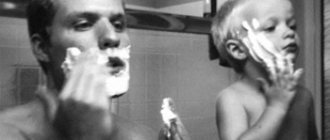When a family grows to one person, everything in it changes. Time begins to flow differently and obey new requirements. During the first year of a child’s life, his parents get used to their new status, study issues that did not concern them before, and are in constant self-improvement.
Child development by month from 0 to one year
The issue of raising and developing a child up to one year comes to the fore.
A newborn child is a new member of the family. It's time to start educating
Month one
It is necessary to take care of a child from the very first days of his life. Within a year, the foundation for its further development is laid. No matter how it may seem that the baby still does not understand or perceive anything, this is not so. From the very first days, the baby reacts to sounds, distinguishes the tone of a conversation, the melody of speech, distinguishes light from darkness, smells the presence of its mother nearby, feels touch.
The child has developed unconditioned innate reflexes, for example, he looks for his mother’s breast and sucks it, shudders from sharp sounds, steps with his legs if he is held vertically above the surface, grabs with his hands, and about seventy other different reflexes. The baby is not as maladjusted as he seems.

During this period, it will be correct to develop and raise children using simple methods. Develop color vision by placing bright contrasting mobiles and rattles-garlands at a distance of 30 cm from the baby’s eyes. Teach to fix the gaze by moving a bright rattle in front of the baby’s eyes to a distance of about 20 cm, and then, after waiting for the gaze to fixate on it, moving it to the sides, up and down. Develop your baby's hearing by talking to him tenderly, turning on music, and rattling melodious rattles.
It is necessary to carry the child in your arms, give him tours of the apartment, and tell him about everything around him.
Physical education of children
For its full growth and prevention of colds, the baby must receive hardening procedures from the first days. To do this, you can wipe the baby’s body and face with a piece of wet cotton wool and leave him naked for a few minutes. In the warm season, you can give your baby air baths 2-3 times a day and extend their duration to half an hour.
Read also
Treatment of a runny nose during pregnancy: effective medications and traditional methods of therapy, possible complications
While the baby is lying naked on the changing table, accustom him to gymnastics and massage. How to massage an infant? Let's look at a few simple techniques:
- Stroking. Start the massage with this technique and end with it. From the end of the first month, with gentle sliding movements of your hands, stroke the baby’s body in the direction from the periphery to the center (legs - from the feet to the buttocks, arms - from the hands to the shoulders), the back and tummy - in a circular motion clockwise. A simple action will relax and calm a baby in the first or second month of life.
- Effleurage. It is not recommended for thin children. Lightly tap with the edge of your palm all the soft places on the baby’s body: the upper part of the legs, butt, back.
- Trituration. Starting from the 4th month, rub the skin and muscles of the baby with just your fingertips. Rubbing the muscles tones them and encourages them to work and develop.
- Kneading. Using light pressure movements, massage all the baby’s large muscles - this will increase the flow of blood and oxygen to them. Reception is recommended for children from 3 months of age.
Second month
Throughout the first year of life, physical contact is important for a child. A feeling of closeness and security. You need to carry the baby in your arms, give him a massage, smile at him as often as possible and try to make him smile.
In the second month of life, it is important to continue to develop children's vision and hearing. Objects for study are already placed at a distance of 30-50 cm from the baby’s eyes. The sounds to learn are becoming more diverse.
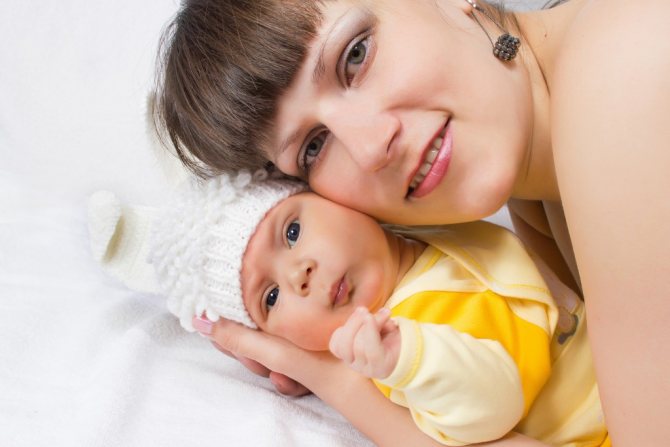
At two months, the most important thing for a child is physical contact with his parents.
It is important to develop tactile sensitivity by giving the child materials and toys of various textures.
To develop the ability to hold the head in front of the baby lying on a flat surface, move some bright object or roll a ball. The baby will watch him and tense his neck muscles.
Third month
A baby in the third month can laugh, gurgle, and show emotions. The attention of others is important to him. Mom, dad, grandmothers need to take him in their arms, talk to him, talk about what is happening around him, read books.
At this age, you can play with the child with rattles and balloons. Bells, bells... everything that the child wants to reach and feel the uniqueness of the object. It is necessary to help the child learn about the diversity of the world around him.
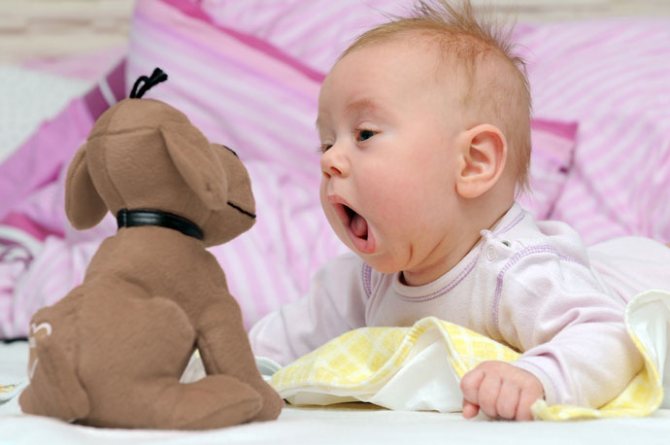
A 3 month old baby holds his head well and responds to toys
At this age, children already copy the worldview of their parents. If the mother perceives something with fear, the baby will also be anxious.
To raise a child to be brave and confident, you need to show more positive emotions and smile at the child more often.
Fourth month
During this period, the baby already confidently holds his head, actively gestures with his arms and legs, explores them, and rolls over. Now the child is already looking at objects, and not just seeing them. He distinguishes voices and sounds. Feels the need for her mother not only to study herself, but also everything around her.
It is necessary to monitor the child’s daily routine and adjust it as necessary. At three to four months, a baby should have an average of about 15 hours of sleep. 10 at night and the rest divided into three naps during the day.
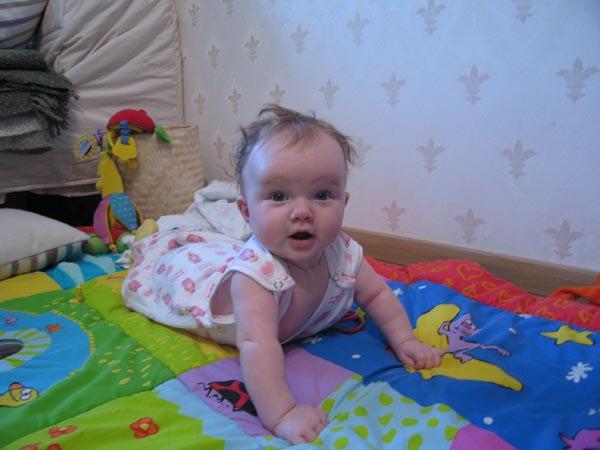
A 4 month old baby rolls over on his own and tries to move.
If the parents have decided that the baby should sleep only in his own bed, then already at this age it is necessary to put him there for every nap, to instill discipline not only in the child, but also in yourself.
Education without mistakes

The responsibility of parents to their children is very high. After all, from the very birth of a child, they must be involved in his upbringing, monitor the correct development and formation of personal qualities. It is in their power to raise him so that the child grows up happy and does not experience such feelings as disappointment or his own inferiority with age.
Many fathers and mothers want to know how to raise children correctly; the psychology of parenting mistakes will allow them to understand what not to say to a child or do to him:
- In raising a child, parents need to give up possessive feelings. After all, they have a personality in front of them. Let it be quite small (for now), without experience and skills, but with its own needs and talents. We need to help him become a real person, and not make impossible demands on him or show all-encompassing care towards him. Overprotection is one of the most common mistakes parents make.
- A public reprimand usually greatly hurts the child and forces him to worry about what happened alone. After all, if dad or mom took advantage of the moment and presented the baby in front of his peers or teacher in a bad light, then it will become clear that he has no one to seek protection from. In order not to traumatize the child’s psyche, it is better to invite him to discuss this case later, without strangers.
- The threat of physical punishment is not the best choice for adults. Because intimidation cannot solve problems. Moreover, the child will quickly realize that an empty threat does not entail anything. As a result, it will become even more difficult to call him to order. In this case, you need to be able to reach the baby and have a serious conversation with him.
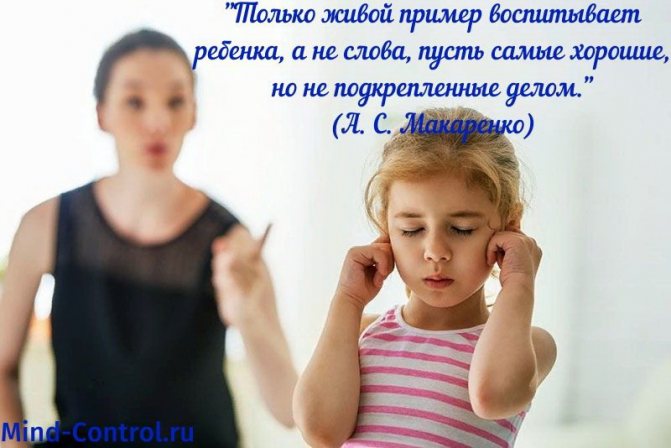
Trying to scare a child is also a pretty bad argument. Having trouble sleeping? We need to understand whether it is his fault. Maybe he was allowed to play a little computer or outdoor games before bed. Emotional excitement takes a long time to pass, you should just wait until the baby calms down, and next time offer him a book or draw a little. Adults should not forget that scary bedtime stories are a direct path to enuresis, which is not always easy to cure.
Month five
The baby no longer just gurgles and coos, but makes distinct sounds. He can see a toy and reach for it. Can hold it confidently. The child gets his favorite toys. He tries to perceive all things tactilely and taste. The baby is already well strengthened: he rises on his hands, pulls his feet into his mouth, and gets on all fours.

A 5-month-old baby pulls his feet into his mouth and tries to get up on all fours
It is important to continue to maintain as much physical contact as possible with your baby.
Carry him in your arms, talk to him, respond to his remarks, smile at him. Develop a sense of rhythm in a child by dancing to music with him in your arms, accompanying massage and gymnastics with counting.
Sixth month
A child at this age can already hold toys in both hands, rearrange them, and choose the right one. He is able to throw toys, which is more difficult for him than picking them up. Sits and tries to crawl.
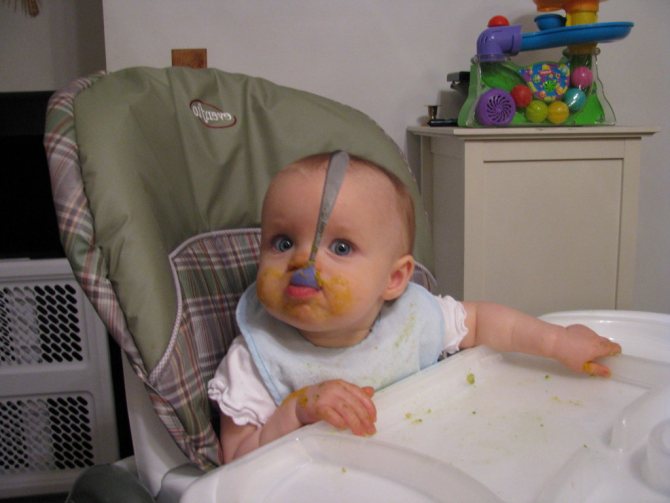
The baby is already sitting well at 6 months
Children of the first year need to be praised for their achievements, both words and actions. Pat children on the head and applaud them.
It gives the child joy that they are happy with him. The baby shows his emotions as best he can, so that he can be capricious and cry in order to reveal his desire for something. The baby does not manipulate his parents, but simply does not know how to communicate his needs or dissatisfaction in a different way. In order not to subsequently raise your baby to be capricious and selfish, you need to try to understand his needs, and not wait for hysterics and heart-breaking crying.
An article about how to properly encourage a child so as not to spoil him
When children are 3 years old, he is already well adapted to the world around him. They start to think about what they are doing. Basically, all their actions are aimed at attracting the attention of their parents. He does not always manage to achieve what he needs by behaving exemplarily. Sometimes the child’s psyche understands that bad behavior is a sure step towards attracting the attention of adults. You should not immediately scold your child if he has committed a bad act. Better analyze your actions.
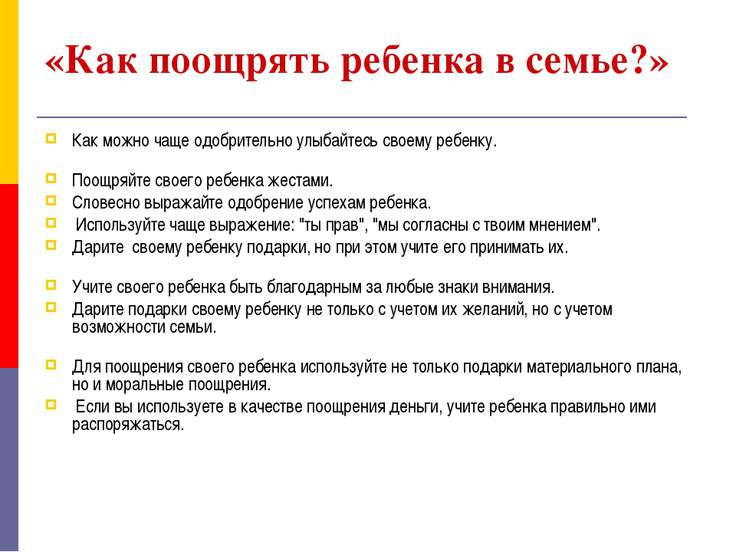
How to encourage a child - tips
Most children at this age behave impulsively. He can laugh and play calmly, and a minute later start crying for no apparent reason. At an early age, children do not yet know how to control their behavior. Parents should not forget about this. If he does not fulfill the requests of adults, for example, does not put away his toys, he is not demonstrating his harmful character, but is simply busy with his own affairs that are important to him. So far, he still does not know how to instantly think about his actions. The correct reaction of parents in the current situation affects the future development of the child.
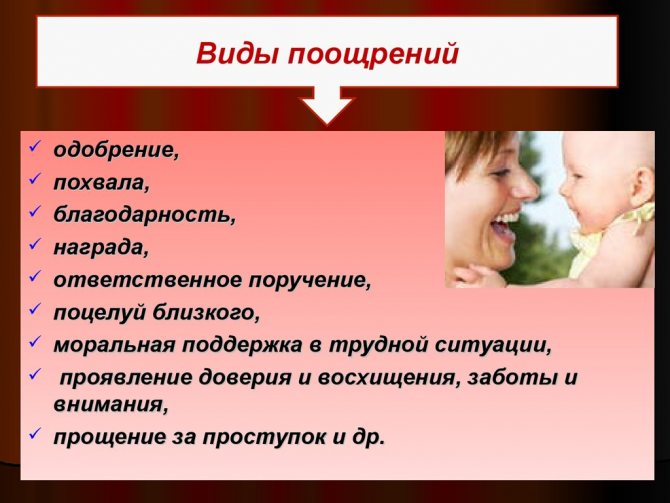
Types of rewards in the family
The formation of a child’s personality, the child’s healthy and strong psyche, largely depends on the parents’ attitude towards him, as well as the time spent playing in childhood, and the reaction of adults to the child’s bad behavior.
Month seven
The child is developing a new routine. Parents should be attentive to the baby and help him adapt to this. The baby sleeps 13-14 hours a day. 10 hours at night and two daytime naps of 1.5 or 2 hours. It is necessary to help the child develop speech by repeating words several times, pointing to objects and naming them.
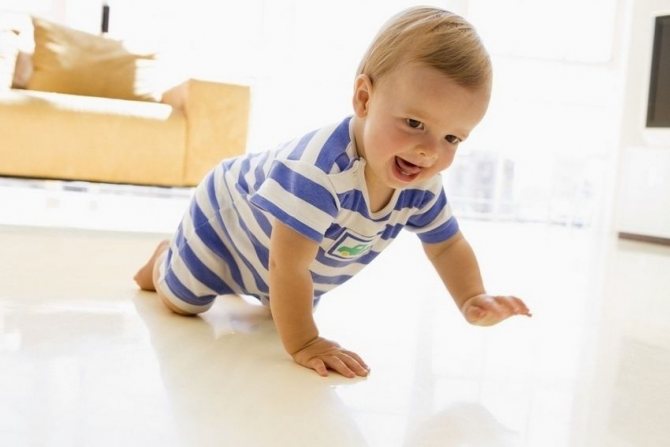
Baby crawls confidently at 7 months
Children's emotional attachment becomes noticeable. A baby may cry not only from a feeling of hunger, but also from a feeling of anxiety, fear, and insecurity without his mother.
The child distinguishes the tone with which they speak to him; it is necessary to use this to educate the baby, speaking to him affectionately or strictly.
Basic concepts of child-rearing psychology
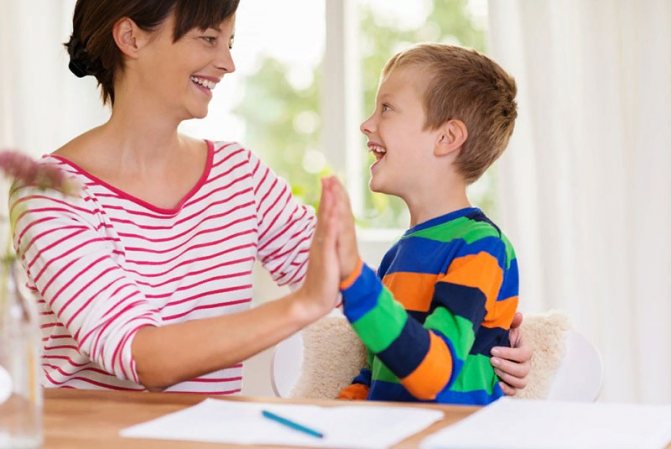
The concept of “education” is considered by various sciences. It is often used in psychology, pedagogy, sociology, and philosophy. But due to the polysemy of the concept itself, there is still no single definition, since it changes along with the development of society. Education is the purposeful influence on an individual carried out by other people, the purpose of which is to develop behavioral skills, attitudes towards oneself, work and society, and an evaluation system.
It is also associated with other concepts, such as:
- Personality formation. This is a process of personal changes that occur during interaction with objective reality, the emergence of new psychological and social formations in the personality structure.
- Becoming. The child reaches a certain level of development at which he understands his relationship with the world and can make his own choices. And he will also be ready for independent life.
- Socialization. The individual is in new social conditions, which affects the process of formation of his personality. And, in accordance with this, he establishes for himself the same norms and rules that are accepted in a given society or social group.
The main goal of educational psychology is the development of the child’s personality, the formation in him of useful qualities necessary for a full life.
Depending on the situation in society or on changes in relations in it, the purpose and objectives of education may change. They are influenced by the development trends of society, on which the requirements that are presented to all its members depend.
Eighth month
The baby already knows how to correctly sort toys by color or size. Knows how to perform various manipulations with them: throw, shake, fold, open. The baby smiles at his reflection. Able to sit and stand at a support.
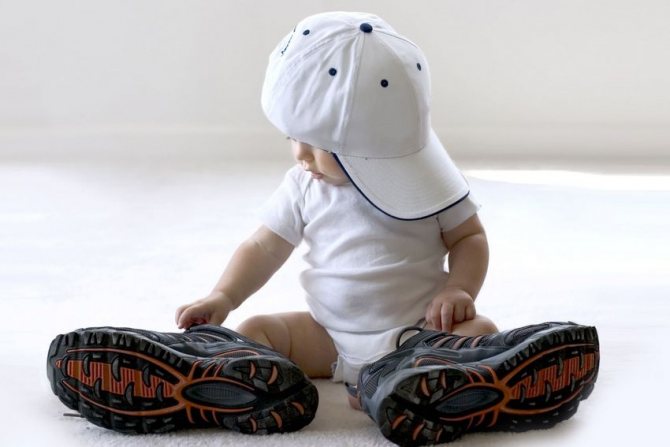
An 8 month old baby understands the purpose of objects
We need to continue to help the child develop. It is necessary to describe the actions that take place, the objects that are involved in it. When speaking, you should not distort words like a child, they need to be pronounced correctly. You need to listen to the child’s babble and respond to him so that the baby understands how communication occurs.
The most important thing is to tell your baby more often about your love and how lucky he is that he is who he is.
Rules for raising children under one year of age
In the end, let's talk about the rules that must be present in any case, no matter what strategy of behavior and education you choose:
- love your baby unbiasedly, for what he is, show your love and care in emotions, looks, touches, and not in toys and goodies;
- maintain the “golden mean”, demand from the baby what he can do and do not let everything take its course. requirements, prohibitions and permissions must be the same for all people surrounding the baby.
If one parent plays “good”, allows what the other parent does not allow (one allows him to put his hands into the plate, but the other does not), and minimizes the demands of the other, this will be fertile ground for the development of bad habits and pathological ones in the child. patterns of behavior.
In conclusion, I would like to say that a holistic, harmonious personality can be raised and educated by the same holistic, harmonious personality, so do not forget about your own development and personal growth.
Do not try to take out your complexes, neurotic manifestations and other problems in your baby.
Ninth month
The baby consciously pronounces his first words and tries to take his first steps. He became especially interested in all the little things around him. He stands wherever there is support. Adults need to be especially attentive to their child and to what arouses his interest.
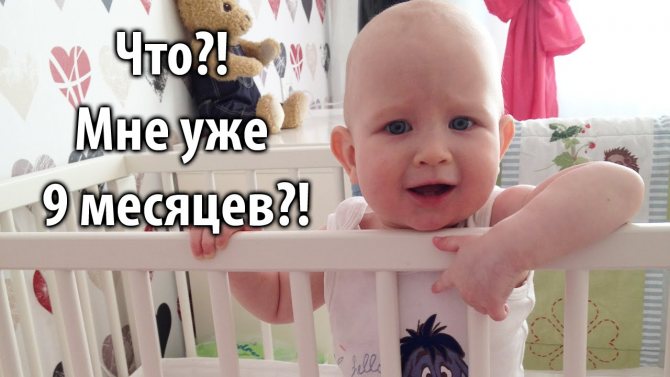
A 9-month-old baby understands speech and moves with support
It is necessary to continue to support the child’s interest in development and knowledge up to one year and beyond. All children's games and toys are an object of cognition. And things and objects from the everyday life of adults are doubly interesting. Don’t forbid your child to study them, but explain how they work and how they work.
Psychology of a baby under 1 year old
Everyone knows the parable about the wise man who answered the parents who came to him that they had lost exactly as much time for upbringing as their child had reached the age of. It can be found everywhere, and sometimes it has very different interpretations.
Popular wisdom that says that a child should be raised while he is placed across the bed, as well as the widespread popularization of early childhood development methods - all this prompts parents to think about education from the very first days of the baby’s life.
What is raising babies? What are the features of raising a child under one year old? What methods should be used to raise a worthy person? A lot of similar questions swarm in the heads of parents. Let's start to figure it out in order.
Tenth month
The child understands a lot of what is said to him. He enthusiastically plays the games “Peek-a-boo,” “magpie-crow,” and “okay.” He is happy when he is praised. The child already has fairly well-developed coordination and can reach almost anything that interests him, crawling, standing up, or moving any objects. The child no longer needs a mother for this.
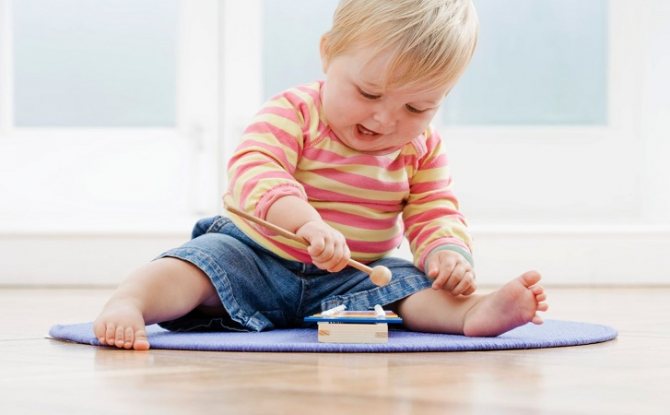
A 10 month old baby finds his own game
It is necessary to give him space for movement and self-realization, nurturing independence and self-confidence in the baby, while constantly keeping his movements under control.
Month eleven
The baby understands and fulfills simple requests: give me a rattle, bring a ball, open a box, sit here... You need to praise the child for the actions performed, and encourage him all the time. You shouldn't scold when something doesn't work out.
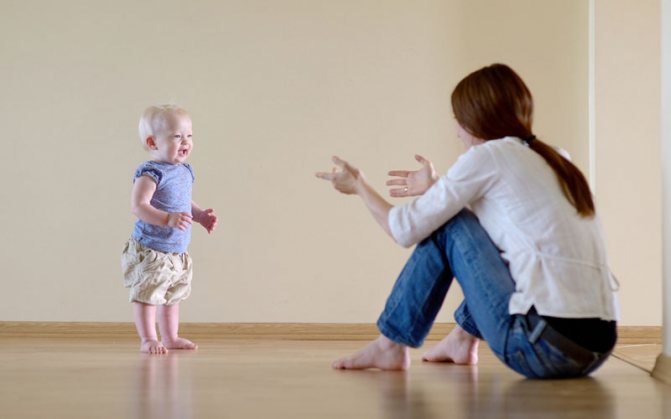
11 month old baby begins to walk
At this age, it is necessary to create conditions for the child to communicate with other children. We need to teach him the simplest communication skills and explain that he should not be afraid of strangers.
Twelfth month. The baby is one year old!
A one-year-old child understands “impossible” and “possible” and distinguishes not only intonations, but also words. He can speak his own language. Those close to him can understand him, strangers cannot. One-year-old children are wary of strangers. A child’s games become completely varied and educational: he already knows how to assemble a pyramid, disassemble a car, and dig in the sand.
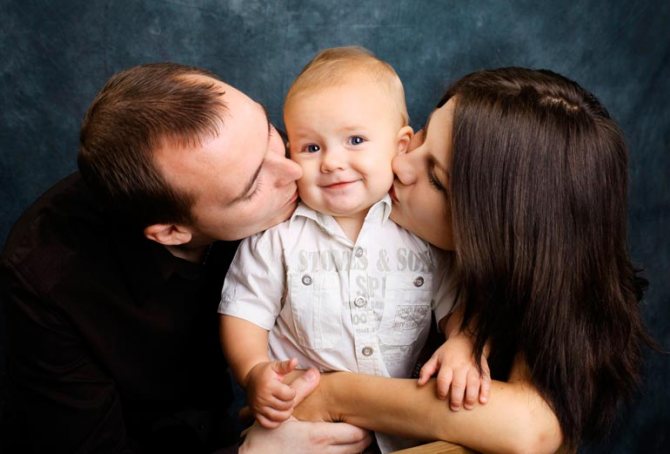
For children of any age, the main thing is the love of their parents
It is still necessary to do a lot with the child, involving games in his development and education, for example, pyramids and cubes develop motor skills, nesting dolls, sorters and various boxes develop cognitive abilities, cars, gurneys improve coordination of movements.
The most important thing in the upbringing and development of a baby under the age of one year is constant physical contact with him.
Accustoming to feeding, establishing a daily routine, daily walks, games - all small steps in raising children of the first year should be done with great love.
Principles for raising a child under one year old
The main principles of proper upbringing of children from birth to one year are the positive attitude of the parents (primarily the mother), the absence of rudeness (including in the form of a rude and raised voice).
You should also not shift the problems of caring for and raising a child, children, and infants to loving grandparents. The psychology of the older generation is such that older people are obliged to give advice to everyone, failure to follow which can lead to dissatisfaction and refusal to communicate.
Important! The main principle is the participation of both parents in raising the child. It is necessary for the child to observe the harmonious relationship between mom and dad.
Raising children begins at birth. Up to a year, the baby goes through many stages of development, during which loving parents can fully educate and develop him, based on physical and mental skills, using various suitable techniques.











